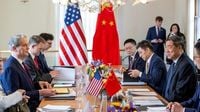On Sunday, September 14, 2025, the ornate halls of Madrid’s Palacio de Santa Cruz became the unlikely epicenter for a trio of global economic showdowns. U.S. and Chinese officials gathered behind closed doors to hash out festering trade tensions, the ticking clock on TikTok’s American future, and Washington’s latest campaign to squeeze China over its oil business with Russia. The stakes, while not exactly world-shifting in the short term, were high enough to draw the world’s attention—and Spain’s best diplomatic foot forward.
The delegations arrived early. Scott Bessent, the U.S. Treasury Secretary, and Jamieson Greer, the U.S. Trade Representative, were the first to step through the palace doors, just minutes ahead of China’s Vice Premier He Lifeng and top trade negotiator Li Chenggang. According to U.S. officials quoted by Cryptopolitan, this was the fourth such meeting in as many months. The last round took place in Stockholm back in July, where both sides managed to agree on a 90-day pause that temporarily froze some tariffs and—crucially—restarted rare-earth exports from China to the U.S. That fragile truce, for now, remains in place.
President Donald Trump, never one to shy away from economic brinkmanship, has since extended the current 55% tariffs on Chinese goods until November 10. Yet, despite the tough talk, trade experts are quick to temper expectations. “No one is expecting any breakthrough in Madrid,” one veteran analyst told Cryptopolitan. “This round is mainly about stopping things from getting worse.”
Spain, meanwhile, is making the most of its moment in the diplomatic spotlight. The Spanish government, eager to be seen as a heavyweight in international affairs, has been pitching Madrid as a new stage for global disputes—including the ever-simmering Israel-Palestine conflict. Spain’s Foreign Minister, José Manuel Albares, even welcomed both delegations personally, underscoring the country’s ambitions. As one senior Spanish official put it, “Spain is pushing to host a major peace summit on the Israel-Palestine war.”
But back to the main event: TikTok. The Chinese-owned social media giant, operated by ByteDance, has been caught in the crosshairs of U.S. national security hawks for months. The company faces a hard deadline of September 17 to sell its U.S. operations or face an outright ban. The U.S. government has already granted three extensions, and according to a senior official close to the White House, a fourth is all but certain. “A deal is not expected, but the deadline will be extended,” the official told Cryptopolitan.
This Madrid meeting marked the first time TikTok’s fate was officially on the Treasury’s agenda. The move, some say, is as much about optics as substance—giving the Trump administration a way to look tough on China while quietly buying more time. Not everyone in Washington is happy about the slow roll, especially since Congress—on both sides of the aisle—has already voted to force a sale on national security grounds.
Adding a twist to the drama, President Trump himself recently joined TikTok, opening his own account in August. Yet, he’s remained silent on the timing of the decision. Wendy Cutler, a former deputy U.S. Trade Representative and now head of the Asia Society Policy Institute, sees the administration playing a longer game. “I expect major deliverables to be held until a possible Trump-Xi meeting later this year, maybe during APEC in Seoul,” she explained. Cutler also noted that any eventual deal could involve more than just TikTok—think easing soybean restrictions, dropping tariffs related to fentanyl, and revisiting U.S. export controls. Still, she cautioned, “Unless there’s some breakthrough on its demands to China, I don’t see the U.S. giving up any leverage.”
Meanwhile, the Madrid talks weren’t just about apps and tariffs. The U.S. used the occasion to press its G7 allies for a coordinated response to China and India’s ongoing oil imports from Russia. Scott Bessent, in a joint statement with Greer, didn’t mince words: “Only with a unified effort that cuts off the revenues funding Putin’s war machine at the source will we be able to apply sufficient economic pressure to end the senseless killing.” The U.S. has already slapped an extra 25% tariff on Indian goods, but China has so far avoided similar treatment—at least for now.
The G7 finance ministers, meeting in parallel, discussed plans to accelerate the use of frozen Russian assets to help fund Ukraine’s defense. It’s a move that signals growing impatience in Western capitals with the slow progress of economic pressure on Moscow. The Madrid session also touched on the murky world of illicit tech shipments. The U.S. wants Beijing to halt sales of certain goods to Russia that are allegedly aiding the war effort in Ukraine—a concern the Treasury has lumped under the umbrella of “combating money laundering,” though the real focus is on enforcement and tech surveillance.
China’s Ministry of Commerce, for its part, made it clear that it would respond to U.S. complaints—and raise its own. Beijing remains frustrated by the ongoing tariffs, expanding export bans, and the ever-growing list of tech restrictions. None of these positions have budged in recent meetings. In fact, China is expected to push back even harder against what it sees as Washington’s aggressive use of economic tools to hobble competitors.
Madrid’s moment in the sun isn’t just about global power politics. Spain is also using the event to mend fences with the Trump administration after a tense spring. Madrid has refused to meet NATO’s defense spending target and has openly criticized Israel’s actions in Gaza. The country even irked Scott Bessent back in April by calling Beijing a “strategic partner,” just as Trump was ramping up his tariff campaign. Scott’s retort at the time? “That’s like cutting your own throat.”
As the dust settles on this latest round of talks, one thing is clear: Madrid has cemented itself, at least for now, as a serious venue for high-stakes diplomacy. The big issues—trade, tech, and geopolitics—remain stubbornly unresolved, but the willingness to keep talking is, perhaps, a small victory in itself. Whether these conversations will lead to real breakthroughs or simply kick the can down the road remains to be seen. For now, the world watches and waits, as the clock ticks toward the next deadline and the next round of brinkmanship.


